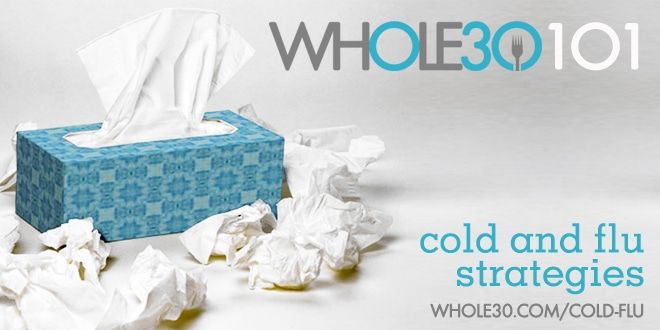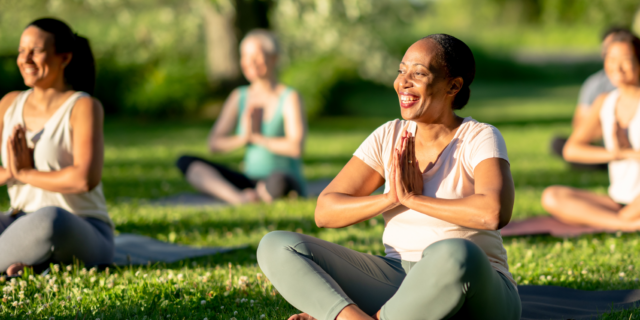The first thing we’ll say is that we hope you never have to use this information… because if it’s of interest, it means you’re sick, and that’s sucky. The Whole30 can do incredible things for keeping your gut healthy, allergies at bay, and your immune system strong and responsive, but sometimes, the flu, a cold, or food poisoning is stronger than even your Whole30 Tiger Blood.
And sometimes (especially in fall or winter), what starts off feeling like a typical Day 2 “carb flu” can morph into a dizzy, feverish, nauseous mess… which you’ll fight and rationalize and try to out-stubborn, usually to no avail.
Let’s face it. You’re SICK.
Is what you’re experiencing a normal Whole30 side effect? CHECK HERE.
If you find yourself sick while on the Whole30, here are some big-picture recommendations.
Big-Picture
Rest and sleep. This is the most important thing you can do to support your immune system as it fights off invaders. Skip your CrossFit workout, power yoga class, or heavy lifting session and either catch some extra sleep or opt for a nice, easy walk outside. (Low-intensity, easy movement is good for the immune system, and my mom says fresh air is, too.) Take naps, go to bed early, and for the love of all your office-mates… call in sick if you wake up feeling worse.
Hydration. Staying hydrated, especially during the flu, is mission-critical.
- Water (sparkling or still), and feel free to add lemon or fresh-grated ginger
- Herbal tea: Traditional Medicinals’ Gypsy Cold Care and Throat Coat are both Whole30 compatible, as are many herbal teas (just read your labels). Peppermint or ginger tea can also help with nausea.
- Whole30 Approved bone broth is a mineral-rich cold and flu-fighter and hydration source.
- If you’re a regular coffee drinker, caffeine may feel good if you have a cold, but if you’re experiencing digestive distress of a flu, you’ll probably want to avoid.
- If you’re really struggling to keep things down, try adding some Whole30 compatible electrolytes like LMNT Raw Unflavored to your water.
See this post for other Whole30 Approved hydration ideas.
Food. The good news is that the Whole30 is perhaps the best thing you can do (in terms of your diet) to strengthen the immune system. The bad news is that you’d much prefer Saltines, ginger ale, or a bagel to chicken and broccoli and a cold LaCroix. Sticking to your Whole30, even if you have the flu, is generally the smartest move you can make. The trick is finding foods that are both palatable and compatible. Some suggestions:
- BRAT: Bananas, (cauliflower) rice, applesauce, and (sweet potato) toast. The BRAT diet is a favorite of pediatricians dealing with little upset tummies, but you can apply the same principles here. These foods are pretty mellow on digestion and easy to find (or make) compatible.
- Soft-scrambled eggs
- Mashed sweet potatoes with ghee and salt
- Apple slices with ginger (a cruise ship trade secret for nausea)
- Spicy foods (for a cold). Our friend Mark Sisson says that capsaicin, the spicy component found in peppers and chilis, reduces nasal inflammation, helping you breathe easier.
Looking for more Whole30-friendly comfort foods? Mel Joulwan has you covered.
That having been said, always follow doctor’s orders when you’re sick, even as it comes to food. Also, if the only thing you can keep down happens to be gluten-free toast (and you know from prior Whole30’s that GF grains don’t totally mess you up), just make the call—you’re a grown-up, and you know your own body (and sickness) better than we do.
Supplement. Honestly, by the time you get a cold, it’s basically too late to impact the duration or severity, according to the Mayo Clinic and US Department of Health and Human Services. (Yes, even echinacea; sadly, the evidence that the herb will prevent or treat a cold is weak to non-existent.)
Making sure you’re regularly consuming these micronutrients through real, whole foods and smart supplementation may keep you from getting sick in the first place, however.
- Zinc: Taking zinc (usually in the form of a lozenge or syrup*) may shorten your cold by a day or so, but only if taken within the first 24-hours of onset. The jury is out on whether a zinc supplement works the say way, and zinc nasal sprays are not recommended due to their potential for side effects (like loss of smell).
- Vitamin C: Despite what your mama told you, taking vitamin C during a cold won’t help the duration or severity… but regular healthy consumption from fruits and vegetables may help you prevent a severe cold in the first place.
- Vitamin D3: Vitamin D3 won’t shorten the duration of a cold, but studies show smart supplementation and sun exposure can help prevent upper respiratory infections.
- Probiotics: Regularly supporting your gut flora can increase the ability of the immune system to fight a cold or flu virus. Fermented foods are a good option here.
Still, everyone has their “I swear, this works!” herb, tincture, or pill, so as long as the ingredients are compatible and you check with your doctor first, feel free.
*Many over-the-counter cold and flu remedies (like zinc lozenges, Airborne, or Nyquil) will contain added sugar or other non-Whole30 ingredients. Always follow your healthcare provider’s orders, even if it conflicts with Whole30 rules. (Doctors know best!) And if it’s a matter of taking the Nyquil and sleeping through the night, or sticking to the Whole30 and being miserable, well… sweet dreams. (We’re pretty sure no one sips Nyquil for the sugar hit.)
Tips and Tricks
Now that we’ve covered the basics, let’s talk about some add-ons you can use to feel better in the moment—tried and tested by the Whole30 team and all totally Whole30 compatible.
Steamy showers and humidifiers. The steam can loosen congestion, keep airways lubricated, and help you breathe easier… plus it just feels good.
Essential oils. We’re not essential oil experts, but Melissa swears by a few drops of peppermint or eucalyptus in her diffuser at night to help her breathe. Still others say a drop or two under the nose or added to the shower floor or wall can help with congestion.
Ginger steam. Heat a pot of water with some sliced ginger in it; transfer to table and breathe in steam, covering your head with a towel.
Detox bath. This mindbodygreen yogi swears by a “detox bath,” a mixture of common household ingredients and essential oils.
Vick’s VaporRub. In that same Sisson post, Mark reminds us that Vick’s is just essential oils: menthol, camphor, eucalyptus, cedar, and nutmeg; a natural herbal blend designed to clear congestion and improve sleep. Rub some on your bare chest and throat and cover with a warm, dry cloth, or dab it under the nose (gently!) for cold, cough, or respiratory infection relief.
Neti pot. This is Melissa’s favorite tool once she feels her sinuses start to congest. It’s basically a plastic or ceramic pot (looks like a tiny tea kettle) designed to irrigate your nasal canal. Translation: you pour a mixture of pleasantly warm water and sea salt up one nostril, and it comes out the other. (Trust. It’s been around for centuries.) This helps keep nasal passages moisturized, and can clear out stubborn mucous.
Bonus: Add a teaspoon of colloidial silver to the pot, as a potent anti-bacterial agent.
Feel Better!
While it would be lovely to think your Whole30 and healthy food freedom diet alone will keep you in tip-top shape, chances are at some point, you’ll succumb to whatever is going around (as we all do from time to time). If that’s the case, we hope these tips have you back on your feet fast.
And remember—before taking any new supplement or cold/flu remedy, check with your healthcare provider… and doctor’s orders always trump Whole30 rules.
Some of the links featured are affiliate links, meaning we make a small commission when you purchase a product using the link. We only recommend products we truly like and use ourselves. Thank you for supporting our Whole30 partners.















